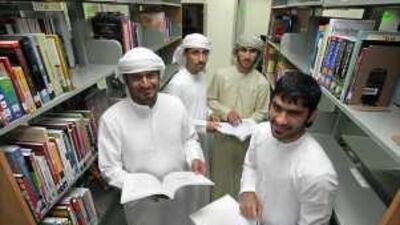ABU DHABI // Their friends wonder why they do not want to be engineers or lawyers. They are asked how they cope with classes of 30 naughty children. They are asked, "Why you?" Because, they say, they feel a calling. And because they believe they can make a difference.
"For people who want to be teachers, it's not about the money; it comes from inside," said Abdulrahman Ali al Attas. Male Emiratis make up just 11.3 per cent of teachers in the emirate's government schools. And that percentage may get smaller before it gets bigger. Mr al Attas is one of just six male students alongside 200 females in years one and two at the Emirates College of Advanced Education (ECAE) in Abu Dhabi, the only dedicated teacher-training institute in the country. He is studying to be a primary teacher and is in the second year of a four-year programme.
From the weeks spent as student teachers at government schools, the men can already see the advantages for children. "Children like to follow the male more than the female," said Fahad al Hosani, 21. "The role model at home is the father more than the mother and he controls the children. Children don't concentrate so much on the female teachers. It's easier to discipline for a male." According to the Abu Dhabi Education Council (Adec), only 486 male Emiratis are teachers in government schools, versus 3,823 females. For expatriate teachers, the trend is reversed. There are 3,764 men and 2,685 women.
The major benefit of having Emirati men in the classroom is a "better understanding of the pupils and local culture", said Ahmed al Busaeedi, 20. He said primary education is "the most important stage" for a child, laying the foundations for the future. "When I stood in front of the class, I could feel they respected me," he said. "They looked up to me. Even beyond the teaching, if something's bothering them at home or at school, they feel they can trust you and talk to you, tell you their problems."
ECAE has provided training to 600 mostly female Emirati teachers since its establishment in 2007. Ian Haslam, the vice chancellor at ECAE, said that he suspects school systems all over the world would like to see more men teaching at the primary level. "Data indicates that 15 per cent seems to be a good target for education systems in knowledge-based economies," he said. "At various times some systems slip to as low as nine per cent and move to as high as 18.
"The first thing the college would like to do is to recruit more male students to its initial teacher-training programme. But more importantly, for the future of teaching and learning, is to be able to recruit as diverse a teaching population as we can." A subsidiary of Adec, the ECAE is one of the instruments being used to draw Emiratis into teaching. Students spend 23 hours in the classroom each week and at least three months a year working in the field. Prospective teachers seem to agree that classroom discipline is their biggest challenge, followed by meeting the needs of different levels and abilities in a class of 30 pupils.
"I've really had to learn patience," Mr al Hosani said. "You have to keep the children busy all the time. Otherwise they're standing on tables, throwing things at each other." Saeed al Ameri said advances in technology have enabled teachers to be more creative; they can use film, music and visual tools such as PowerPoint presentations. Mr al Hosani said change is needed in government schools, citing old buildings and poor facilities.
The six male students, who are from Abu Dhabi, agree that if training institutions like ECAE existed in other parts of the country, more Emiratis would become teachers. Mr al Ameri said: "There must be more incentives and opportunities, like there are in the police or the army." mswan@thenational.ae

